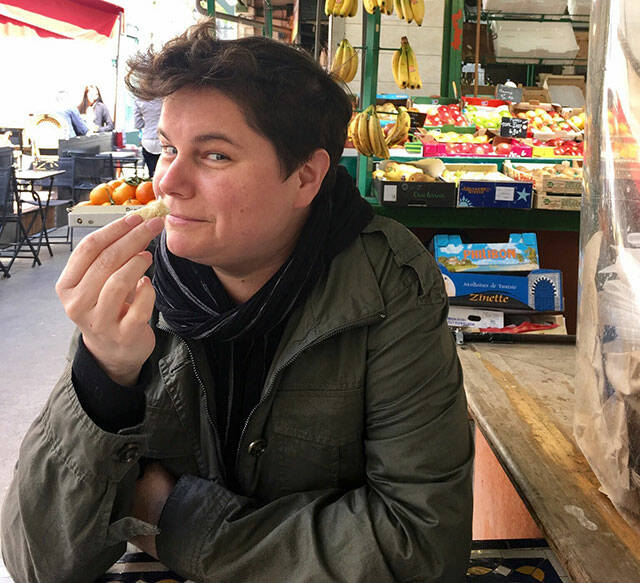In his opinion piece “On Giving Each Other Room to Think” (April 14), Pastor Mike Ivaska decried what he called the “totalizing approach” of progressivism, saying that he “resonated with the libertarian ethos of “You do your thing, and let me do mine.”
That intrigued me. I’d like to share some thoughts on his piece specifically while acknowledging that I’m also responding to hundreds of echoes of worn-out refrains pitched time and again by folks trying to find polite ways to tell me to shut up already about my civil rights.
Initially, I’d say that of course there’s room to call for productive discussion. I yearn for it too. But before we can get there, it’s vital to understand who’s asking for that “civil” discussion and why.
“Can’t we discuss this rationally” is a bad-faith argument put forth for centuries by white, straight, Christian men to sideline and silence the legitimate, vital concerns of women, children, people of color, and those who are systemically oppressed and denied fundamental human rights. It’s an argument often used to belittle those who have finally found the footing and the voice not to ask for — but to demand — their equal place in society.
Ask for room to speak. But understand that listening does not equal agreement or compromise or free you from the consequences of your speech or politics.
If you’re using your speech to entrench racist repeals of the Voting Rights Act and move our country further toward Jim Crow, don’t be surprised if the answer from BIPOC communities is an unequivocal no. If you’re using your space to speak to advocate for legislation that criminalizes and codifies second-class status for LGBTQ+ communities, don’t be surprised if the LGBTQ+ community throws a metaphorical glitter bomb in your face. If you’re using your space to defend the state-sanctioned lynching of Black folks, don’t be surprised if you find yourself labeled.
If you fear a label, work harder to shed it. It’s what women and people of color, Indigenous, and differently-abled folks have done since this nation’s founding. We can’t afford to be so fragile. The voiceless don’t have the chance to write the rules of engagement for discussion, and we have already asked nicely.
As far as the ungrounded musings about religion co-opting politics, that’s a pretty fragile glass house to be throwing stones from when it comes to progressive versus conservative Christianity. I will say it’s not a lay Democratic legislature trying to ban math books in Florida for “indoctrinating students.” I’ll also balk at the assumption that I do not value family or individual responsibility because I’m not a conservative Christian. A bold swipe from someone calling for compassionate discussion.
There are folks of faith from all walks of life, so I’ll come at it like this: if you say, “I can’t do that because of my religion,” that’s one thing. But when you say, “you can’t do that because of my religion,” we have a problem. It was conservative Christians who decided that I could not “do my thing,” by marrying my wife. Doesn’t seem to me like conservatives really are all that “more willing to let differences be.” Libertarianism is a nice idea but in practice simply a way to turn a blind eye to structural inequalities intentionally baked into the system.
As far as “good people on all sides,” I’ll let the Republican response to the events in Charlottesville in 2017 answer that question. And for middle ground, it’s naïve or disingenuous to call for it when it comes to civil rights. Middle ground is for “where should we build that road,” not “who deserves full Constitutional protections.” If I say, “my wife should not be fired from her job for being gay,” and you say, “yes she should,” I will absolutely not “move toward you.”
Never-ending conflict is the wind slave owners, land thieves, and conservative Christians have sown to reap power and privilege. It’s disingenuous to whine about the whirlwind as countless women go missing on reservations, innocent Black men wait to die on death row, and our Earth burns. If you want to keep that power and tell us we don’t deserve basic civil rights, you’re going to have to fight for it.
If you have the privilege to put politics second and discuss these issues from an unaffected rhetorical position, you’re not close enough to suffering. If you are asking those who are suffering to be kinder to you as you theoretically discuss their plight and do nothing to alleviate it but tell them to quiet down so you can think, you will be labeled. Fear that? Perhaps it’s painful, perhaps it’s unearned. But rest assured — there are those in your community who fear much worse — yes, even on Vashon.
Don’t ask those who are suffering and struggling for the right to breathe the free air to pull punches because your ceaseless campaign to deny us our humanity is frustrating you. We’re out here trying to lift our families and communities from the legacies of oppression: poverty, hate crimes, despair, serial murder, addiction, firings, beatings, and lynchings.
For those asking for room to think, I ask, “think about what?” The right and wrong answers are already plenty clear to me.
Amy Drayer is a writer and splits her time between Vashon and Denver.



